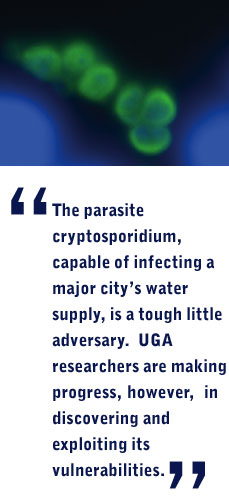


In Search of Crypto's Achilles Heel
by Renee Twombly
Intro
|
Built To Succeed
|
Hitting It Where It Won't Hurt Us
|
Is Man A . . . Protozoan?

![]()
The Bug That Made
Milwaukee Famous
What Keeps Them Awake at Night?

Built to Succeed
Cryptosporidium—or “Crypto” to those who study it—is as tough as any organism known. In its dormant state, as a little hard-shelled spore, it could be stored in sulfuric acid. On a more practical level, the chlorine used to treat drinking water has no effect on the protozoan, thereby putting much of the U.S. water supply at risk for a Crypto outbreak. In fact, more than 400,000 residents of Milwaukee were sickened by Cryptosporidium in their drinking water, and thousands of children in a New York state park became ill when spores rained down on them while playing in a “sprayground.” (See Notable Outbreaks sidebar.)
Not surprisingly, up to 80 percent of the United States population has been exposed to Crypto, according to the Big Bad Bug Book of the U.S. Food and Drug Administration. This conclusion is based on survey evidence that many individuals’ immune systems have produced antibodies to the parasite, meaning they have successfully fended off an infection. Likely, the human hosts never knew what that little gastrointestinal problem they had was all about.
The parasite can also hitch a ride on any food touched by a contaminated food handler or that has been irrigated with contaminated water; small outbreaks have occurred at social events where meals were served. As little as one organism can initiate an infection, the FDA warns.
Crypto belongs to the Phylum Apicomplexa, a large group of single-celled, spore-producing protozoa that includes the parasites responsible for malaria, toxo-plasmosis and an important parasite of chickens, Eimeria.
In its various forms, Cryptosporidium can infect everything from birds to mice—and also chickens, which are important to Georgia’s economy—but it seems to be prevalent among herd animals such as cows, goats, sheep, deer and elk. In the past, when a human got an infection it was thought to come from Cryptosporidium parvum, which targets cows. But it was only because of the Milwaukee event—the nation’s largest outbreak of severe diarrhea—that scientists discovered the Cryptosporidium hominis variant, which can spread from human to human. (See “Milwaukee” Sidebar.)
When a Crypto spore infects a human and travels to the gut, four small cells shoot out from the shell to invade cells in the intestinal lining. Then, like viruses, the parasites multiply within cells, ultimately to infect neighboring cells. Unlike viruses, which are just little strings of DNA or RNA, Crypto are cellular beings living within other cells. “They are really dependent on many contributions by the host cell,” said Boris Striepen, a cellular biologist at CTEGD.
When a Crypto spore infects a cell, it creates a vacuole around itself with a bubble of membrane. It then establishes channel-like pores through this membrane to gain access to the host cell. Critical to this process are membrane-surface “transporters” that allow the parasite to essentially grab anything of interest passing by in the host cell’s fluid. For example, because it doesn’t make sugar as a fuel, Crypto has a sugar transporter.
“All the ingredients needed for cellular metabolism are pretty freely available in the cytoplasm of the host cell,” Striepen said. “So they take it out of your cell and bring it into theirs. They are using the host cell for food and shelter.”
The organism is really well put together for survival purposes, he added. “They are set up to succeed, and they succeed fairly often.”
Intro
|
Built To Succeed
|
Hitting It Where It Won't Hurt Us
|
Is Man A . . . Protozoan?
For comments or for information please e-mail: rcomm@uga.edu
To contact the webmaster please email: ovprweb@uga.edu
![]()